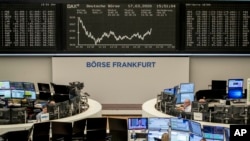European stocks dropped on Friday while U.S. stock futures marked a downturn, indicating a lower opening on Wall Street, as coronavirus cases in America pass China's.
The Stoxx Europe 600 index fell 1.7% and the FTSE 100 index (Financial Times Stock Exchange) lost 3.1%.
Dow Jones Industrial Average stock futures fell more than 2% and so did S&P 500 and Nasdaq-100 futures.
Asian markets closed mixed on Friday with Japan’s Nikkei index gaining 3.88%, and the Hang Seng in Hong Kong and the Shanghai Composite index barely in positive territory.
In Australia, the S&P/ASX 200 fell 5.08%.
The advances followed U.S. stocks surging again Thursday after the Senate passed the $2 trillion coronavirus relief bill with the House likely to follow Friday.
The Dow Jones Industrial Average shot up 1,352 points, a 6 percent gain. The S&P 500 and NASDAQ also climbed 6 percent.
Analysts say U.S. investors shook off the record high 3.2 million new jobless claims recorded last week, expecting that number to be higher.
U.S. President Donald Trump is promising to sign the economic stimulus package as soon as the House passes it Friday.
It aims to flood the U.S. economy with billions of dollars in new spending for businesses, many of which have been brought to a standstill by the coronavirus.
Those businesses have been forced to lay off millions of workers and those who are still working and getting paid aren’t finding too many stores and amusements open in which to spend.
Millions more are expected to file for unemployment benefits in the coming weeks. The U.S. jobless rate is forecast to hit double digits and economists say a recession is almost a certainty.
But it has always been the nature of Wall Street to shake off bad economic news, such as high unemployment. Experts say the markets don’t always run parallel with the economy and that traders buy and sell stocks based on what they see in the months ahead.





